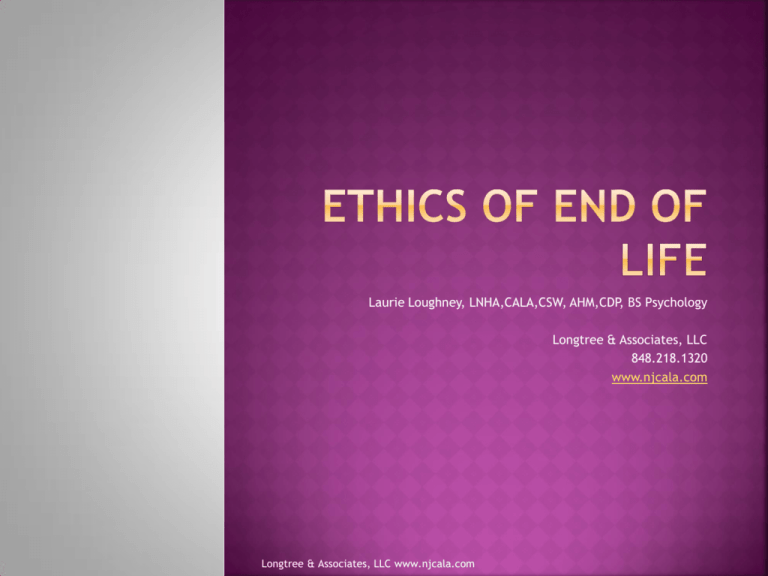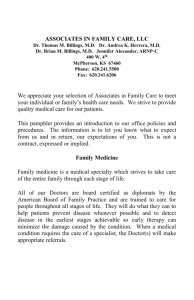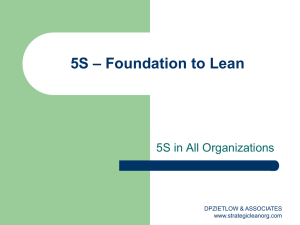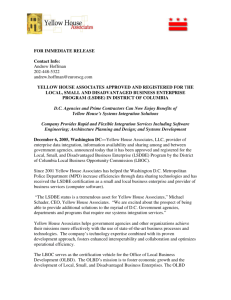Ethics Of End of Life - Senior Planning Services
advertisement

Laurie Loughney, LNHA,CALA,CSW, AHM,CDP, BS Psychology Longtree & Associates, LLC 848.218.1320 www.njcala.com Longtree & Associates, LLC www.njcala.com Laurie Loughney, LNHA,CALA,CSW, AHM, BS Psy. Longtree & Associates, LLC 848.218.1320 www.njcala.com Facebook: LongtreeEducation Longtree provides continuing educations seminars, LNHA Course, CMA Course, CALA Course and the NCCDP approved Dementia Course. Longtree & Associates, LLC www.njcala.com Part I: Brief Overview of the Ethics in End of Life Decision Making Resources: Hasting Center for BioEthics Margaret P. Battin, “Terminal Sedation: Pulling the Sheet Over Our Eyes,” The Palliative Care Policy Center Americans for Better Care of the Dying Part II: Ethics in the world of Long Term Care Part III: End of Life Choices and Alternatives Longtree & Associates, LLC www.njcala.com Framing the Issue End-of-life care and its many dilemmas capture public attention when they make national news. The story often involves a family seeking a court order to remove life support from a patient who, medical experts say, is in a vegetative state with no hope of recovery. The Terry Schiavo case in 2005 14 appeals and numerous motions, petitions, and hearings in the Florida courts; five suits in federal district court; Florida legislation struck down by the Supreme Court of Florida; federal legislation (the Palm Sunday Compromise); and four denials of certiorari from the Supreme Court of the United States. Nancy Cruzan case in 1990 In Cruzan's case the Missouri Supreme Court majority confirmed that the state's interest in life encompassed the sanctity of life and the prolongation of life. She was not terminally ill and, based on medical evidence, would "continue a life of relatively normal duration if allowed basic sustenance." Karne Quinlan case in 1976. When the news fades, so does public attention to end-of-life decisions. Although Quinlan was removed from mechanical ventilation during 1976, she lived on in a persistent vegetative state for almost a decade until her death from pneumonia in 1985. Longtree & Associates, LLC www.njcala.com Approximately 2.5 million Americans die each year in the United States. For the nearly 70% of them who live out their final days in hospitals, nursing homes, and at home in hospice care. Decisions must continually be made about what treatment to administer, what treatment to cease or withhold, what treatment to continue, and what treatment to taper off. Longtree & Associates, LLC www.njcala.com TIMING IS EVERYTHING……… While the fact of death remains inevitable, its timing is often very much a function of human agency. Once it was common to speak of nature taking its course, but today it is more common to view death as a matter about which people— individuals at or near death, or their surrogates—have some control. Longtree & Associates, LLC www.njcala.com The FAMILY ROLE in ETHICS OF END OF LIFE ISSUS • They may forestall death by choosing heroic measures to sustain life, such as resuscitation. • Or they may hasten death by forgoing treatment, or by seeking to take action to bring life to an end. Longtree & Associates, LLC www.njcala.com Longtree & Associates, LLC www.njcala.com BIOETHICS Because of its profundity, end-of-life decision-making occupies center stage in contemporary American bioethics. For three decades, medical professionals and policymakers have looked to bioethicists for advice in shaping medical guidelines and laws on end-of-life care. Longtree & Associates, LLC www.njcala.com BIOETHICS – A Definition a field of study concerned with the ethics and philosophical implications of certain biological and medical procedures, technologies, and treatments, as organ transplants, genetic engineering, and care of the terminally ill. Longtree & Associates, LLC www.njcala.com Focus on Autonomy • Autonomy of the Person • Advance Directives To do otherwise would be an inexcusable invasion of individuals’ interests in bodily integrity and in charting their own life plan in accordance with their own values, preferences, and interests. Longtree & Associates, LLC www.njcala.com When individuals have not made manifest their decisions about medical care, the ethical and legal protocol is to implement a person’s presumed wishes through a doctrine known as “substituted judgment.” Under this doctrine, a surrogate must make decisions for a patient. If the patient has not appointed a surrogate in an advance directive, close family members are ethically and legally empowered to make decisions for the patient. Longtree & Associates, LLC www.njcala.com • • • Too General Too Specific Family did not understand the specifics Longtree & Associates, LLC www.njcala.com Longtree & Associates, LLC www.njcala.com Welfare of the individual Under such circumstances, one might argue that the decisions are inauthentic—they would not serve the person’s best interest as that person would have defined it, had he or she been capable of reasoning. Traditional bioethical analysis contends that there is rarely, if ever, any justification for overruling the decisions of people with decision-making capacity. If a decision seems to be uncharacteristic of an individual— inconsistent with the person’s deeply held values, beliefs, and goals—then inquiring about the soundness of the person’s decision-making capacity is justifiable Longtree & Associates, LLC www.njcala.com The interests of others Some bioethicists emphasize the importance of family and community interests in decision-making at the end of life. However, mainstream bioethical analysis rejects them as valid considerations unless the patient chooses to have them taken into account. So does the law. Although judicial decisions usually proclaim that an individual’s right of self-determination must be balanced against the state’s interest in the well-being of the individual’s minor children, even that interest has virtually never been found to outweigh the patient’s right of self-determination Longtree & Associates, LLC www.njcala.com Interests of health caregivers Societal interest in allocation of scarce resources Medical resources are scarce. That much is uncontroversial. But of all the reasons for overriding patients’ autonomy, the societal interest in the efficient use of scarce health care resources is the most controversial. Some people believe that an individual’s decision to continue medical care at the end of life must be weighed against the cost-benefit ratio Longtree & Associates, LLC www.njcala.com COST-BENEFIT Proponents further contend that it is ethically permissible—indeed, ethically obligatory—to deny resources if they will provide little or no benefit when the cost is being borne in whole or in large part by society: by taxpayers through Medicare, Medicaid, or other government programs, or through private insurance. • BEDSIDE RATIONING Opponents of this position acknowledge the scarcity of resources, but claim that such “bedside rationing” violates the physician’s professional obligation to act solely in the patient’s best interests, and that denial of treatment should be made at the policy, rather than the individual, level Longtree & Associates, LLC www.njcala.com Longtree & Associates, LLC www.njcala.com Longtree & Associates, LLC www.njcala.com Palliative care The realization that patients’ control over their dying needs to include adequate relief of pain has led to increased education of doctors about palliative care. It has also led to laws and medical policies that permit the use of palliative medications even if it unintentionally hastens death. In 2008, the American Medical Association adopted a policy supporting the use of sedation to the point of unconsciousness at the end of life in the rare circumstances when palliative measures are ineffective. Longtree & Associates, LLC www.njcala.com Physician-aided dying The debate over the legalization of physician-aided dying may be heating up again with a referendum to legalize it on the Washington state ballot in 2008. It has been legally practiced in Oregon since 1997, with diminished public controversy and—all but the most stalwart opponents would agree—a great deal of success Longtree & Associates, LLC www.njcala.com Persistent vegetative state Advance directive legislation frequently cites persistent vegetative state as a reason for forgoing life-sustaining treatment. But recent developments in neuroscience have made it clear that this condition is not the unitary phenomenon it was once thought to be Longtree & Associates, LLC www.njcala.com Denial of treatment Perhaps the issue people least want to talk about may prove to be the most important because it is closely bound up with larger issues of health care reform. That issue is the denial of some forms of medical treatment at the end of life because of the belief that they provide little or no benefit and consume scarce health care resources—in other words, rationing Longtree & Associates, LLC www.njcala.com Ethics Longtree & Associates, LLC www.njcala.com ? Palliative Care Family will not agree to a DNR for an actively dying, and terminally ill, patient A wife of a 50-year-old father with advanced ALS is concerned about his increasing admissions to the hospital, wondering if she should sign a do-not-hospitalize (DNH) order A family of an elderly woman with advanced dementia, frailty, and COPD are holding out hopes (against prevailing medical opinion) that her current hospitalization and ventilation will get her back to her SNF A family of an elderly woman with moderate dementia, COPD, and heart issues wonder how much longer she can live alone Longtree & Associates, LLC www.njcala.com “Palliative care is the embodiment of ethics at the end of life.” – Mission executive “Palliative care handles end-of-life and goals of care, ethics assists when there is unresolved conflict.” – Palliative care practitioner “Ethics concerns goals of care, palliative care matches treatment plans to those goals.” – Ethicist “Western medicine tends to turn care modalities into a clinical specialty when they find a way to bill for services.” – Alternative medicine specialist Longtree & Associates, LLC www.njcala.com Joanne Maxwell, Surveyor--‘Take the Ding to do the right Thing!’ In 1993- over 49% of nursing home residents were in restraints…… In 2015… Reduction of Restraints is huge! Longtree & Associates, LLC www.njcala.com • • • • Seeing the patient and family as one unit Resident Centered Care – Matching Regulations Strong emphasis on non-pharmacological interventions Stronger emphasis on enhancing quality of life. Longtree & Associates, LLC www.njcala.com Re-Think Re- Connect Longtree & Associates, LLC www.njcala.com Restore Health Care Cost Longtree & Associates, LLC www.njcala.com CMS SAYS…. Whole Person Approach Care Plans Preferences of Person/ Family Partnerships Decision making Process Longtree & Associates, LLC www.njcala.com 1. Enhance 2. Strengthening the CMS Standards of Care 3. Promote PFCC!! 4. Quality Improvement Plans 5. Strategic Partnerships in Resident carefamily, community collaborations and other clinical partnerships. Longtree & Associates, LLC www.njcala.com In the Nursing Home Federal RegulationsPP – Appendix The word ‘ RESIDENT’ is written over 1,200 times…. The word ‘ Family’ is written over 70 times….. Longtree & Associates, LLC www.njcala.com Community Life ----is more than the activity calendar….. RELATIONSHIPS Lifestyle Including End of Life Longtree & Associates, LLC www.njcala.com You will learn more about a person in an hour of play, than a year of conversation…. Longtree & Associates, LLC www.njcala.com PART III- End of Life Choices and Alternatives WHAT IS A GOOD DEATH? What Does It Look Like? What Does It sound Like? Longtree & Associates, LLC www.njcala.com I- information gathering D- evlop the story E- xplore all conceivable responses A- sses each possible response S- Select a course of Action Longtree & Associates, LLC www.njcala.com EXPLICIT IMPLICIT 1. Safe 1. Supportive Environment 2. Cultural 2. Clinical 3. Philosophical 4. Additional ‘of and3. Regulatory 4. Legal beyond Longtree & Associates, LLC www.njcala.com Against our confidence in mastery and control, we need to remember that old age and dying are not problems to be solved but human experiences that must be faced. In the years ahead, we will be judged as a people by our willingness to stand by one another, not only in the rare event of a natural disaster but also in the everyday care of those who gave us life and to whom we owe so much.” -Dr. Leon Kass, Washington Post article Longtree & Associates, LLC www.njcala.com Longtree & Associates, LLC www.njcala.com





![Your_Solutions_LLC_-_New_Business3[1]](http://s2.studylib.net/store/data/005544494_1-444a738d95c4d66d28ef7ef4e25c86f0-300x300.png)
